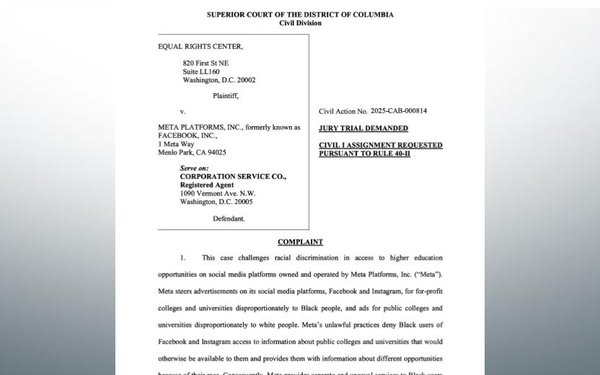
A civil rights group has sued Meta Platforms over ad
algorithms that allegedly discriminate by disproportionately serving ads for for-profit colleges to Black users and ads for public colleges to white users.
“Meta's unlawful practices
deny Black users of Facebook and Instagram access to information about public colleges and universities that would otherwise be available to them and provides them with information about different
opportunities because of their race,” the Equal Rights Center alleges in a complaint filed Tuesday in District of Columbia Superior Court.
“Consequently, Meta provides separate and unequal services to Black users in its places of public accommodations,” the group adds.
advertisement
advertisement
The allegations regarding discrimination are
drawn from a study published last year by researchers from Princeton and University of Southern California who said they found “evidence of racial
discrimination in Meta’s algorithmic delivery of ads for education opportunities.”
The Equal Rights Center, represented by the Lawyers Committee for Civil Rights Under Law, claims
Meta is violating the District of Columbia's civil rights law as well as its consumer protection law.
“For-profit institutions often provide lower quality education at greater cost,
including by charging high tuition rates without investing in critical educational and support services and by diverting funds into marketing and recruiting rather than instruction,” the suit
alleges. “Their students -- Black students in particular -- frequently make less money than students at nonprofit schools, and their graduates -- Black graduates in particular -- often graduate
with more debt than nonprofit college and university graduates.”
Meta allegedly infers information about users' races by collecting a host of data, including information obtained from
data brokers and from other websites that have installed Meta's pixel -- tracking code that provides analytics data. Among the websites with Meta's tracking pixel is the standardized testing service
ACT; the suit alleges that Meta's pixel on that site “registered clicks about a student’s ethnicity and gender, and whether they planned to request college financial aid or needed
accommodations for a disability.”
Equal Rights Center notes in the complaint that Meta has faced prior allegations of violating civil rights laws by facilitating discrimination in
housing and employment ads.
A 2019 study by researchers from Northeastern University, the University of Southern California, and the advocacy
group Upturn s found that Meta's ad-delivery algorithm discriminated based on race and gender when serving housing and employment ads -- even when advertisers did not attempt to restrict their ads to
particular demographic groups.
Meta agreed in 2019 to settle some of
the prior civil rights suits by prohibiting advertisers of housing, employment or credit offers from targeting ads based on age, gender, ZIP code and ethnic affinity -- often used as a proxy for
race.
The company also said in 2023 that it would use a technology it called the “Variance
Reduction System” to combat algorithmic discrimination in housing, employment and credit ads.